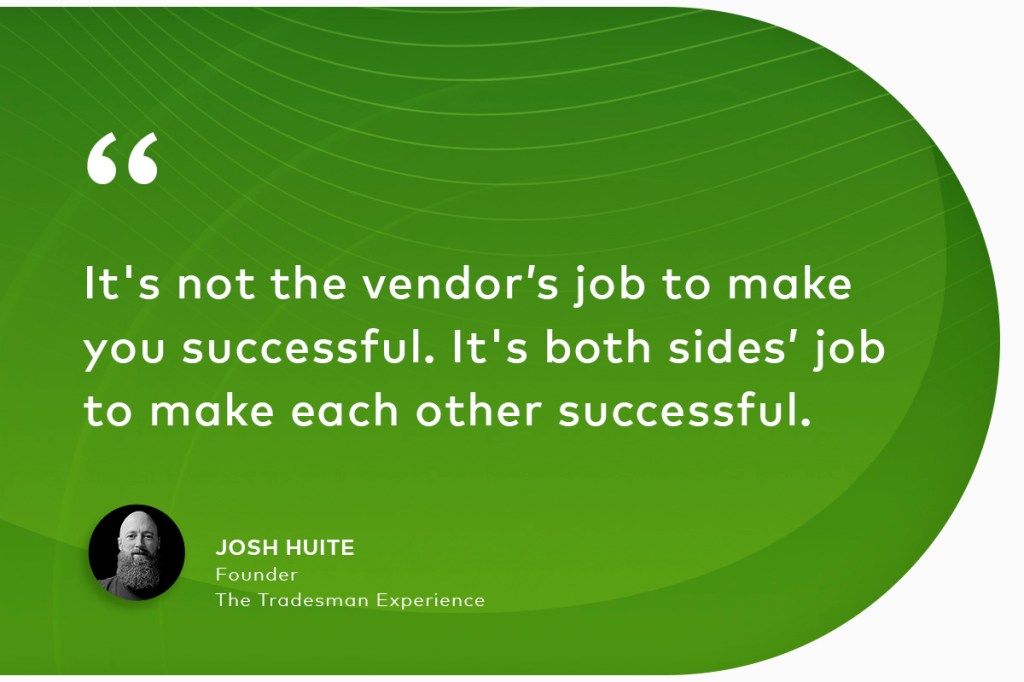
Josh Huite is the founder of The Tradesman Experience, a coaching platform and podcast. His goal is to boost the skills of blue-collar industry workers across all trades, including property management. With decades of hands-on experience and a deep understanding of skilled trades, Josh’s mission is to improve the industry by inspiring businesses to create a culture of leadership, develop operational excellence and fully grasp the value of positive vendor relationships.
In this interview, Josh highlights the importance of effective communication and interpersonal skills alongside technical proficiency. Our conversation focuses on vendor relationships, offering property managers and owners a unique perspective on contract work from the vendor’s point of view. You’re bound to learn something useful that will result in saved money, less frustration and better results from work done on the property.
Blue collar background
Interviewer: Tell us about your background and company.
Josh Huite:My company is The Tradesman Experience, and I have a background in various blue-collar industries dating back to my childhood. I first swung a hammer when I was about three years old. Today, my mission is to elevate the skilled trades industries. I focus on leadership and operations, but I often find myself emphasizing the importance of relationship-building in these industries, which is crucial to the growth and success of everyone involved.
“The vendor effect”
Interviewer: You talk about something called the “vendor effect.” What is that?
Josh: The vendor effect is similar to my definition of the golden rule of business. It’s a reflection of the quality of the team you build. In the property management industry, your team consists of subcontractors, primarily from blue-collar industries. The impact these vendors have ultimately shapes and creates the experience of everyone who lives at that property.
Relationship-centered approach
Interviewer: Why do you focus heavily on relationships?
Josh: Those of us in blue-collar trades were taught how to perform a skill, not necessarily how to communicate and cultivate relationships. I believe the golden rule of business is that people don’t remember what you did, but they will they remember how you made them feel.
On maximizing quality
Interviewer: Why is managing vendors so crucial to maximizing quality in property management?
Josh: It’s interesting you bring up quality, because in the perception and understanding of business, many people in blue-collar industries believe that the quality of their skill set will pave the way for their success. The reality is that the quality of the relationships they build will determine their success, with the quality of their skill set complementing their interpersonal skills.
Vendor selection is crucial
Interviewer: How do you go about finding a good fit in a vendor?
Josh: In property management, finding a vendor requires a two-way interview. Often, when subcontractors apply to work with a property management company, it ends up being a one-sided interview. When I start a conversation with a vendor or subcontractor, one of the first things I ask is, “What are your expectations of me?” This helps uncover what is important to them. It’s not just about my skills.
For example, I spent almost 20 years in the HVAC industry. Sure, I can fix an air conditioner, but that’s not the qualifying metric for determining our working relationship. Understanding the client’s expectations and pain points is crucial. I also communicate my expectations to them. This needs to be a conversation rather than a top-down interview.
On pricing
Interviewer: How should a contractor’s pricing factor into a property manager’s decision-making process?
Josh: I’ve had both good and bad experiences with property management companies. Skilled labor is not cheap, and cheap labor is not skilled. When entering into agreements and having these conversations, it’s fair to assume that contractors know how to do the work you’re asking them to do. However, what’s more important is understanding their quality, standards and expectations. I’ve worked with many contractors who had been in the industry for decades but were terrible at their work. Pricing should reflect the quality and reliability of the service provided, not just the cost.
Establishing trust
Interviewer: How do you determine whether or not a contractor is trustworthy and does quality work?
Josh: Again, it comes down to making the hiring process a two-way interview. Reputation and references are crucial. As a vendor, I would provide references proactively rather than wait for a potential client to ask. A vendor offering references demonstrates their idea of quality work and reflects their character. The quality of these references speaks volumes about their trustworthiness as well as the quality of their own work.
Culture of leadership
Interviewer: You’ve talked about developing a culture of leadership. What does that have to do with hiring vendors?
Josh: I think it has everything to do with it. How you treat your staff is how your staff will treat your hired contractors. When looking at vendor relations, if a company has a healthy culture and good leadership, the hired laborer will bring that excellence to their service.
Negotiating rates
Interviewer: Is pricing always negotiable? Are there times when it’s inappropriate to attempt to negotiate a rate?
Josh: The first thing to understand is that in service-based industries like plumbing, electrical, HVAC and even handyman services, flat-rate pricing is essential. The age of hourly rates is over. Flat rate pricing eliminates a lot of time management issues. For example, when we negotiate with property management companies, we have a set flat rate, but we might negotiate a 15% discount on that rate.
When negotiating flat rates, the volume of work influences how negotiable the price is. For a property management company with 100 doors, if I only work on 20, the price is less negotiable. However, if I’m working on more doors, I might be willing to negotiate a lower price due to higher volume.
Flat rate pricing helps the property manager understand how much they may be able to negotiate. It’s important not to begin negotiations by focusing solely on price. Cultivate the relationship first, set expectations and ensure everyone knows the processes and procedures. Once the relationship is established, you can discuss pricing. For example, after working on several projects or have been working together for a year, you might be able to negotiate the price a bit in exchange for offering more work.
I want to acknowledge that flat rates aren’t always possible. In cases where the work is not a flat rate, it should be bid work. You might even see the rare instance where neither flat rate nor bid work applies, in which case there should be an agreed-upon time and materials contract (T&M). This happens when the scope of a project is uncertain. Both sides can negotiate a top price and agree to reassess when nearing that amount.
The risk of budget limits
Interviewer: If a property manager sets a maximum flat rate for their budget, is it common for contractors to adjust right up to that limit?
Josh: That can be one of the drawbacks of flat rate or even hourly pricing. However, I don’t see it as a money problem: it’s a management and leadership problem. It indicates that both sides are not communicating effectively. If technicians are doing what’s easy instead of what’s right, and the property management company isn’t questioning why there are multiple invoices for the maximum amount, there’s a deeper issue. You need to examine what practices are generating this result and address the root cause to fix the problem.
Software changes everything
Interviewer: How has software changed the game in terms of communication and payments?
Josh: When you match your company with the correct tech, you improve communications with vendors and payments are a lot easier. I would have my clients’ credit cards on file, so when I processed a bill, everything was simple and automated. One of the biggest advantages from the contractor side is that technicians can quickly access the history of each account.
Reluctance around new technology
Interviewer: Are vendors ever reluctant to log in to portals to send invoices and collect payments?
Josh: There’s definitely frustration when vendors have to access different portals for various clients, as payment methods and invoice submission processes can differ. This needs to be addressed through conversation. If a technician is spending up to 30 minutes in the van processing information for each call, it’s costly. To mitigate this, I delegate these tasks to a single operator in the office who can handle all the processing.
Vendors on the blue-collar side need to understand that technology is here to stay. They must comply with these operating procedures, even if it requires a couple more minutes to log in and input information. These technologies increase transparency, accountability and speed up payments.
Interviewer: Why do you think there continues to be reluctance around change, even when that change will save time, money, frustration or whatever the case may be?
Josh: When I left my last company, the iPhone 8 had just come out. The accessibility of technology today compared to back then is vastly improved. It used to be a complete pain to access portals remotely, but now there should be no issue.
If you’re running any type of operating software, every truck should have a database tablet. Instead of making technicians do everything on their phones, provide them with tablets to improve efficiency and ease of implementation. Invest in your operating systems and procedures to complement the technology you use.
Interviewer: What can a property manager do about a vendor who is reluctant to use their software or portal system?
Josh: If a property manager is having this conversation after the fact, they are being reactive. This needs to be an upfront conversation with clear expectations. It goes back to the fact that both sides are entering an agreement. If that agreement includes the use of property management software such as Yardi Breeze, that must be a requirement for doing work on the properties.
To address reluctance directly, they should approach the vendor and say, “Moving forward, our working relationship will require us to use this electronic portal. This is how you will get paid, process calls and submit invoices. Is this something you are willing to do? Because this is the direction we need to take.”
Behaviors to avoid
Interviewer: As a former contractor, are there any behaviors you can suggest that property managers should avoid when hiring or communicating with vendors?
Josh: Yes, let’s talk about the property management side. One major issue is when property management companies use a contractor’s services under an agreed maintenance contract, benefiting from negotiated prices and discounts, but then bypass the contractor when it comes to larger projects or replacements.
For instance, in the HVAC industry, we might have a maintenance contract and everything is running smoothly. However, when it’s time to replace a furnace or air conditioner, the job goes out for the cheapest bid without giving us the opportunity to price it. I’ve experienced showing up to a site to find a new system installed without any notice. This is detrimental to the relationship because it disregards the ongoing commitment and adjustments we’ve made, such as dispatching technicians after hours or accommodating schedule changes.
It’s crucial for property managers to ensure contractors are given a fair chance to bid on all aspects of the work, including large projects, to maintain a strong and trusting relationship.
Evaluating online reviews
Interviewer: How far should property managers trust online ratings? Let’s say they find company with four stars and 1,000 reviews and another with five stars and only 50 reviews.
Josh: There needs to be a bit of due diligence. For instance, if a company has a three-star rating, I look at the low star ratings to understand why. Often, it’s someone complaining about a problem that the company couldn’t solve anyway, which might not be a fair reflection of the company’s capabilities.
It’s important to evaluate how relevant the reviews are to your specific needs. Look at the detailed feedback to determine if the reviews address issues similar to what you might encounter. This approach helps in making a more informed decision beyond just the star rating and the number of reviews.
Final words of wisdom
Interviewer: Any final words of advice for novice property managers on developing positive relationships?
Josh: First, property management companies need to identify their expectations clearly. It’s too easy to assume that the vendor knows how to do the job, which leads to unclear expectations. Sit down and determine what expectations need to be set, what questions you want to ask vendors and how often you want to revisit these expectations to make sure you’re still aligned.
It’s not the vendor’s job to make you successful. It’s both sides’ job to make each other successful. Focus on cultivating those relationships and understand that people remember how you made them feel, not just what you did. As a vendor, every time I walk onto a property, I’m representing both myself and the property management company. Creating the best experience for the tenants is crucial. If you can do that, especially in situations like a broken air conditioner on a hot August day, the tenant will be less disgruntled when paying their rent check.
By prioritizing clear communication, mutual respect and a commitment to positive interactions, both property managers and vendors can ensure a successful and collaborative partnership.



